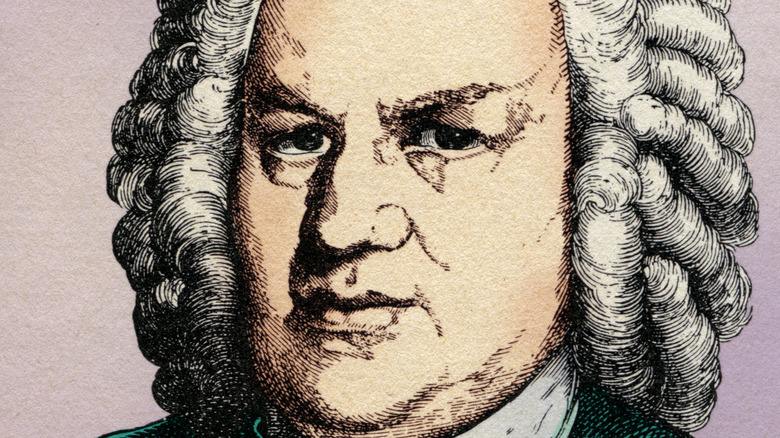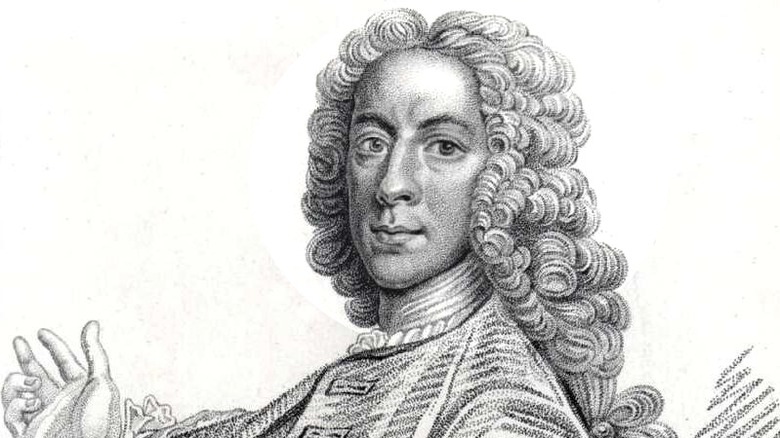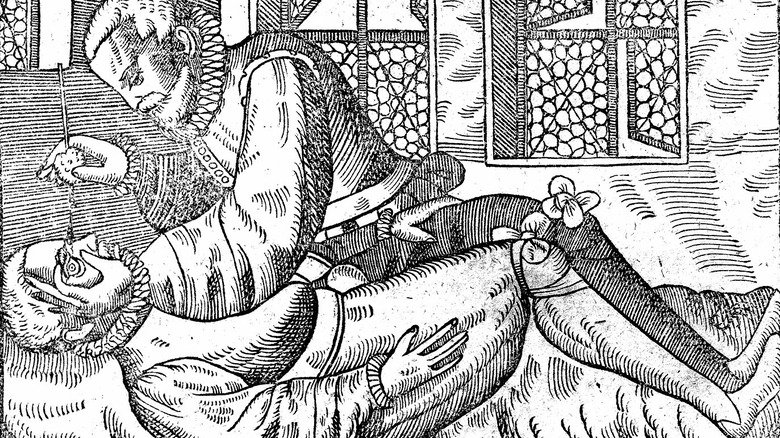The Botched Eye Surgery That Left Johann Sebastian Bach Blind
Johann Sebastian Bach, widely considered one of the godfathers of modern Western Classical music, left a body of work so full of vision and ambition that it has effectively acted as the gateway drug to learning harmony for every music student since. Bach was utterly prolific in his lifetime, working relentlessly as an organist, composer, and conductor, so much so that in hindsight it appears he was possessed with some divinely-ordained degree of genius.
Bach was not just a prolific composer; he may have been the most fertile man of the 18th century in Germany, having spawned 20 children with his two wives (per Britannica). Yet, despite casting such a long shadow, Bach's health would eventually falter. Although we know relatively little about Bach's personal life, some accounts claim that his eyesight diminished with age. Although no evidence exists to corroborate the exact prognosis, cataracts appear to be the most logical cause (per Jama Ophthalmology).
According to Johns Hopkins Medicine, cataracts are commonly caused by age or injury to the tissue that makes up the lens of the eye. Blurred vision develops when the proteins and fibers of the lens degenerate, making light passage through the eyes more challenging. Bach's vision deteriorated so dramatically in 1750 that he underwent eye surgery at the behest of his friends (per Acta Ophthalmologica, posted at the National Library of Medicine). They had no clue that the casual ineptitude of a wandering quack, the so-called "oculist" Chevalier John Taylor, would seal Bach's fate, and that the composer would eventually meet his maker at Taylor's hands.
Giving sight is giving life
In stark contrast to Bach, Chevalier John Taylor's legacy is far more contentious; he has gone down in history as a massive charlatan. It appears that he adhered to the "fake it 'til you make it" school of medicine. Taylor was widely known as a flamboyant physician who mingled with many members of high society, owing in large part to his magnetism. Taylor would tour Europe in an opulent coach adorned with paintings of eyeballs in a peculiar traveling medical show, in which he would conduct public eye surgeries (via Acta Ophthalmologica, posted at Wiley Online Library). Taylor would be dressed to impress in opulent gowns and jewelry. He would frequently entertain the spectators with tall tales and amusing anecdotes before performing the surgery, and he would be long gone by the time patients "took their bandages off." His bedside manner was simply "grab the money and bounce" (per University of Wisconsin-Madison).
His "party trick," so to speak, was a cataract surgery known as "couching" (per the Ghana Medical Journal, also posted at the National Library of Medicine). This treatment entailed inserting a needle into the eye and pushing the cataract-clouded lens out of the field of vision and toward the back of the eye. No, it didn't work.
Taylor's malpractice is acknowledged to have been so catastrophic that even he confessed to blinding hundreds of individuals in his life. One of the twisted ironies of this entire tale is that Taylor's carriage was also emblazoned with the Latin slogan "qui dat videre dat vivere," which translates to "giving sight is giving life" (per Wiley Online Library).
Blind leading the blind
How did these two men even cross paths? Taylor was swindling his way around Europe in the spring of 1750 when he arrived at Leipzig, Germany, where Bach lived. Bach, presumably short of options for eye surgeons, took a chance on the traveling oculist and prayed for the best.
Unfortunately, this would be his undoing. We can only speculate how awful Taylor's (and every other doctor's) grasp of medical hygiene must have been given, that this was the 19th century. Since this occurred before the advent of anesthesia, the entire experience would have been just as harrowing. To make matters worse, Taylor's recommended post-op care would be just as sickening. Taylor's patients could expect bizarre treatments such as bloodletting, laxatives, and eyedrops made from the blood of slain pigeons (per Wiley Online Library).
Unsurprisingly, this surgery had pretty devastating effects on Bach's vision, which required another surgery a week later. Not only was this second surgery botched, it resulted in a post-operative infection that dramatically reduced Bach's quality of life and rendered him completely blind (via Jama Ophthalmology). Bach's impairment would be so severe that it permanently hampered his capacity to compose music. In the final months of his life, Bach couldn't conduct, or play the organ, and had to dictate the notes to an aide for his final compositions (per Wiley Online Library). Less than four months after Taylor's second surgery, Bach would finally succumb to his injuries. Right before his death, Bach momentarily regained his vision, before suffering a stroke and high fever and dying on July 25, 1750 (via "Bach" by Malcolm Lloyd).


